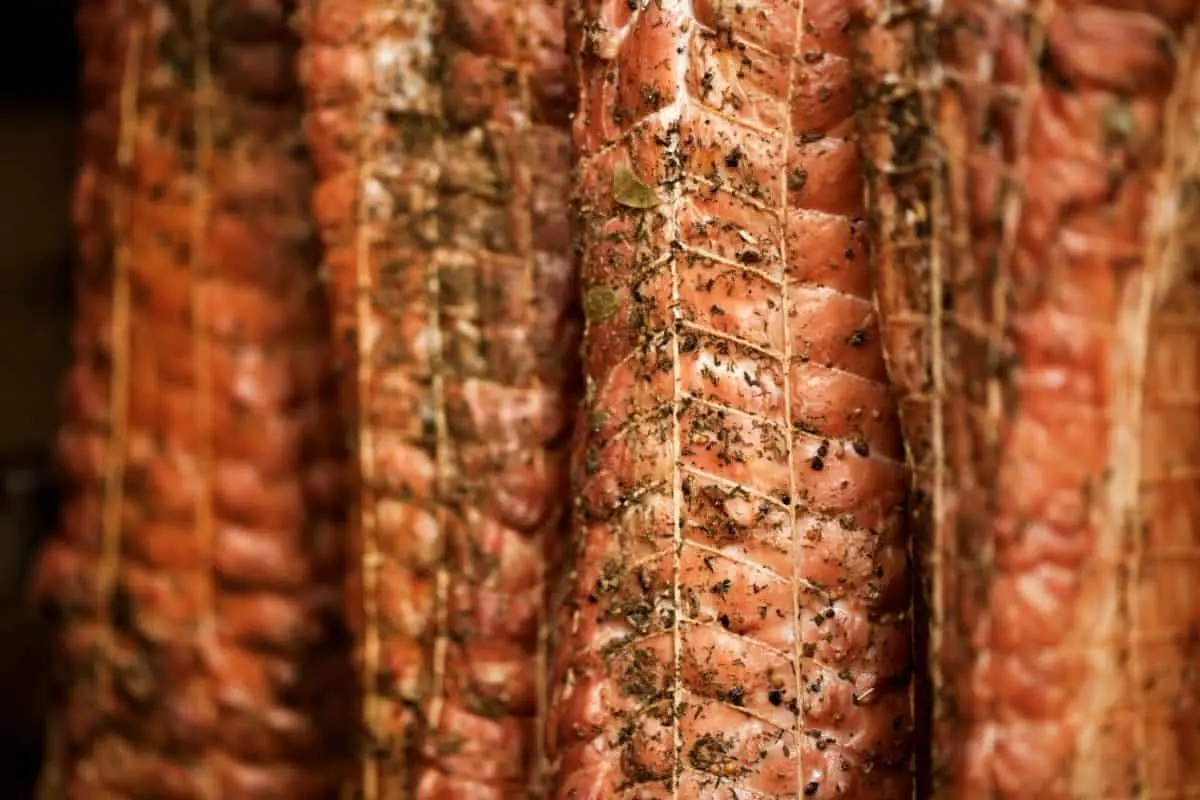For some people, it is just the smell that makes smoked meat so unpleasant – but there are many other reasons why you may want to avoid smoked meats.
Toxic compounds, like polycyclic aromatic hydrocarbons, heterocyclic amines, and nitrosamines, as well as harmful bacteria and high levels of sodium, can be found in smoked meat and fish. These are carcinogenic and toxic to the body and dangerous to your health, the reason smoked meat can make people feel sick.
In this article, I’ll take a look at why it might make you feel sick and the ways to protect yourself from these hazards to make sure your smoking adventures are safe and (relatively) healthy.

In this post we'll cover:
Why might smoked meat make you feel sick?
Smoked meat contains chemical compounds that are known to be toxic to the human body as well as carcinogenic (cancer-causing).
These chemicals have been found to be present in processed foods such as bacon, sausages, hot dogs, ham, and luncheon meats.
Some of the dangerous compounds found in smoked food are:
- nitrosamine
- acrolein
- acrylamide
- furan
- heterocyclic amines
- monochloropropanediol (MCPD)
- polycyclic aromatic hydrocarbons
Difficult words that don’t sound too tasty right?
In fact, wood smoke itself is composed of a mixture of about 380 compounds, that in combination with high heat, react with the enzymes and proteins of the meat.
While they improve the taste of the meat (yummy smoke flavors) and also extend the shelflife of the product, there are health concerns related to the compounds.
Nitrosamines for example are formed when proteins are heated over high heat and then exposed to nitrogen dioxide gas.
This process creates an unstable molecule that reacts with amines in the protein, creating nitrosamines.
The levels of nitrosamines in smoked meat vary depending on how the meat was cooked.
When meat is smoked using traditional methods, the levels are low. However, when smoked using modern techniques, the levels increase dramatically.
The reason these levels increase is that modern smoking machines use higher temperatures than traditional smokers.
This means that more of the amino acids in the meat react with the nitrogen dioxide gas, producing more nitrosamines.
When you smoke your own meat, you can control the temperature and time of cooking, and therefore control the amount of nitrosamine created.
If you choose to buy pre-smoked meat, you will still get more nitrosamines. So it’s best to cook it yourself because you end up with much fewer nitrosamines.
What is the damage smoked meat can cause?
The main reason that smoking meat causes so much damage is because of the chemicals used to preserve the meat.
The smoke contains ammonia which reacts with proteins in the meat causing them to become toxic.
This means that if you eat too much smoked meat then your body will start producing more ammonia than normal.
As well as this, the nitrites in the smoke make the meat taste bitter and also cause cancerous cells to grow.
If you have any concerns about eating smoked meat then try cutting back on how often you eat it or stop altogether.
Does smoked meat cause diarrhea?
Another reason smoked meat can also make you feel sick is that it can contain bacteria that cause food poisoning.
So why does smoked meat make me poop or upset my stomach?
Salmonella, E. coli, and Listeria are a concern when it comes to smoked meat. These pathogens can manifest due to the long period meat can be exposed to low temperatures and can cause flu-like symptoms, diarrhea, vomiting, and stomach cramps.
The most common type of bacteria found in smoked meat is Listeria monocytogenes.
This bacteria can cause severe illness, particularly in pregnant women, the elderly, and young children.
To protect yourself from these risks, you should always make sure your meat is fully cooked before eating it.
Ideally, cook the meat until it is steaming hot all the way through and then let it cool down before eating it.
You should also avoid eating meat that has been sitting out at room temperature for too long.
If you are pregnant, it is best to avoid smoked meat altogether.
If you are elderly or have a weakened immune system, then you should cook the meat thoroughly before eating it.
Can I be allergic to smoked meat?
Some people are allergic to pollen proteins found in BBQ wood like mesquite and hickory that in extreme cases cause a life-threatening anaphylactic reaction, or may irritate your throat and eyes, but there has never been a case of an allergic reaction to smoked meat.
Smoked meat contains a lot of salt

Another reason why smoked meat can be harmful is that it often contains high levels of salt.
Salt is important for our bodies to function properly, however, when we consume large amounts of salt over time it can lead to heart disease.
When you eat smoked meat you are consuming a lot of salt at once, which could increase your risk of developing heart disease.
If you do decide to eat smoked meat then try to limit yourself to one portion per week.
And switch it up as well, changing meat with smoked fish and even smoked vegetables for a varied diet.
Smoked mackerel, for example, is high in omega 3 fatty acids, that have beneficial effects on your heart and brain health.
Can smoked meat cause heartburn, indigestion, and acid reflux?
Heartburn, indigestion, and acid reflux are often caused by foods that stay in the stomach for much longer than other foods. Foods known to do that are fatty meats, which smoked meats often are.
How to avoid health problems
One way to avoid all of these problems is by choosing not to eat smoked meat.
If you want to enjoy smoked meat but reduce the risks associated with it then you need to know what you’re getting into before you begin.
When buying smoked meats, you should also read food labels carefully, looking out for terms such as “nitrate” and “ammonium”.
These are two common preservatives found in smoked meat.
When you smoke your own meat, you have more control over the quality of the meat you are cooking.
Always go for high-quality cuts, make sure you handle them safely and ensure that they are cooked well to avoid pathogens.
Don’t burn the food, however, as that can increase the carcinogenic compounds in the meat.
It’s always better to be safe than sorry when it comes to food safety.
Final thoughts
Smoked meat isn’t necessarily unhealthy. However, there are certain types of smoked meat that you shouldn’t consume due to the risk they pose to your health.
If you want to enjoy smoked meats without worrying about any potential health issues then you should choose high-quality cuts and always keep food safety top of mind.
By smoking your own food, you can keep nitrates and ammonia levels down which is a bonus. Another reason we love smoking our own meat here at Lakesidesmokers!
And finally, everything in moderation. Don’t fire up the smoker every day, but save it for those special moments in the year, when only a perfectly smoked brisket, reverse-seared smoked steak, or aromatic lamb shoulder will do.
